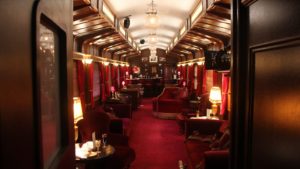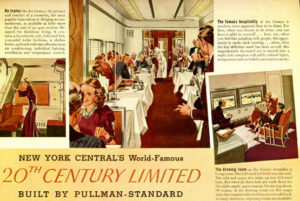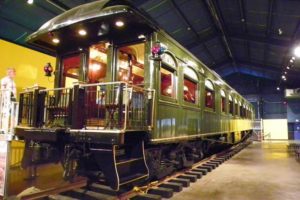 A friend sent me a review of Night Trains, a new book by Andrew Martin about the rise and fall of Europe’s once-celebrated luxury sleeper trains:
A friend sent me a review of Night Trains, a new book by Andrew Martin about the rise and fall of Europe’s once-celebrated luxury sleeper trains:
Martin is particularly good at describing these night trains in their pomp, when they were the best, and sometimes the only, way of getting round Europe reasonably fast. However, the service declined markedly from the 1970s, and what had been a service aimed at Europe’s elite became a very mundane one. My experience on the Orient Express in 2006, three years before it was finally killed off, was typical: the only food available was the worst crustless white plastic cheese sandwich I have ever eaten. A desperate raid of the automatic machines on Strasbourg station yielded only nuts.
 When it comes to night trains, I share the sentiments of Martin and Christian Wolmar, the reviewer, enough so that Mrs. T and I went so far two years ago as to take a sleeper from New York to Florida and back, an experience that I wrote about here and here. But unlike my first trip on a sleeper, this one was a disappointment, enough so to make it unlikely that I’ll ever do it again. I fear that I’d read far too much about the great trains of the past, and seen too many of them lovingly portrayed by Hollywood, to be capable of appreciating the much-diminished charms of their latter-day descendants.
When it comes to night trains, I share the sentiments of Martin and Christian Wolmar, the reviewer, enough so that Mrs. T and I went so far two years ago as to take a sleeper from New York to Florida and back, an experience that I wrote about here and here. But unlike my first trip on a sleeper, this one was a disappointment, enough so to make it unlikely that I’ll ever do it again. I fear that I’d read far too much about the great trains of the past, and seen too many of them lovingly portrayed by Hollywood, to be capable of appreciating the much-diminished charms of their latter-day descendants.
Hence I confess to a certain skepticism about the trustworthiness of Wolmar, who claims in his review that “Amtrak, the state-owned railway in the USA, runs a series of very comfortable long-distance overnight trains.” If Amtrak is his idea of comfort…well, let’s say I don’t share it, and leave it there.
To be sure, I still love trains—or, rather, the idea of trains—and I expect I always will. All my life I’ve found the sound of train whistles almost unbearably evocative. As I once wrote in this space:
My brother tells me that more freight trains have been passing through Smalltown lately, and though the tracks are halfway across town from my mother’s house, you can still hear the whistles loud and clear. My mother thinks they sound mournful, but I never thought so. They used to make me curious about the big world somewhere down the track, and now that I live in that big world, they remind me that I have things to do back there.
 Small wonder that I was an ardent fan of The Wild Wild West, a TV series of the Sixties whose nineteenth-century protagonists traveled from caper to caper on a private train. Ever since then I’ve dreamed in vain of doing the same thing. While Mrs. T and I were in Sarasota earlier this month, we visited the Ringling Museum, whose exhibits include the resplendent private car on which John and Mable Ringling traveled throughout America, and my childhood dreams sprung to life once more.
Small wonder that I was an ardent fan of The Wild Wild West, a TV series of the Sixties whose nineteenth-century protagonists traveled from caper to caper on a private train. Ever since then I’ve dreamed in vain of doing the same thing. While Mrs. T and I were in Sarasota earlier this month, we visited the Ringling Museum, whose exhibits include the resplendent private car on which John and Mable Ringling traveled throughout America, and my childhood dreams sprung to life once more.
Alas, the American Orient Express went bankrupt before I could book a trip to nowhere, and I doubt I’ll get another chance to relive the good old days of luxury train travel. Not enough Americans love trains to make it worth anybody’s while anymore. Unlike me, they see them as slow, bumpy, exasperatingly uncomfortable ways of getting from point A to point B, not as the miraculous vehicles of romance about which Johnny Mercer and Jimmy Van Heusen wrote so evocatively and well:
I took a trip on a train
And I thought about you.
We passed a shadowy lane,
And I thought about you.
Two or three cars
Parked under the stars,
A winding stream.
Moon shining down
On some little down.
With each beam,
Same old dream.
With every stop that we made,
I thought about you.
And then I pulled down the shade
And I really felt blue.
I peeked through the crack
And looked at the track,
The one going back
To you.
And what did I do?
I thought about you.
That’s how I feel about trains.
* * *
The Miles Davis Quintet plays “I Thought About You” in 1961:
